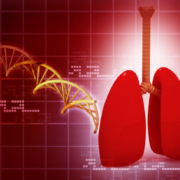B6, B12, and Lung Cancer
The overwhelming message from the study I’ve been reviewing this week: don’t smoke cigarettes. Period. That’s the true cause of most cases of lung cancer. There was no increase in lung cancer in subjects taking high doses of B6 or B12 who never smoked or in those who quit more than 10 years before the study began. While the increased risk applied only to men, women shouldn’t smoke either: 44% of those who got lung cancer were women.
For those men who still insist on smoking or quit less than ten years ago, is there anything to be concerned about if you megadose on B6 or B12? It’s hard to know for sure.
I spoke with the primary author via email. Dr. Ted Brasky and I have battled over omega-3s in the past but minor disagreements in methodologies aside, he is a top-notch researcher. He doesn’t think the B vitamins cause cancer. What he thinks may be happening is that the carcinogens in cigarette smoke cause damage to lung cell DNA, and the excess B vitamins may be enhancing the initiation of cancer. I agree with him.
The question is why might this be happening? The lack of B vitamins seems to reduce the DNA repair process, so increasing to normal levels seems to help. But overdoing it may not be beneficial. Some smokers are taking high-stress B supplements with hundreds or thousands of micrograms of B12. Those are the smokers who could be at risk.
There are two explanations that make sense to me. First, there may be a mutation in the gene that manufactures the enzyme methylenetetrahydrofolate reductase, the enzyme that helps convert homocysteine to methionine. That enzyme requires B12, but perhaps it malfunctions and the B12 becomes toxic to the cells damaged by smoking.
The second explanation comes from the article itself. When trying to explain the factors that could impact this relationship between smoking and vitamin intake, researchers suggest there may be a difference in the absorption, utilization, or distribution of the vitamins. In other words, some people may absorb more vitamin B6 or B12 than others, resulting in a higher circulating amount and thus more available for cells to use. In normal conditions that may be fine but with smoking-induced damage, it may not. The fact is we just don’t know at this time.
The Bottom Line
Back to addressing those headlines. If you don’t smoke, there is no problem based on this study. If you do smoke, taking a multivitamin, a B-complex with reasonable amounts of B vitamins, or using energy drinks should present no problem: the study showed no increases with the amounts found in those types of products. If you do smoke, until there is research to clarify the actual cause, limit your intake of high-stress Bs or megadoses of vitamins B6 and B12.
Or maybe the best idea is to just quit smoking. I know it’s hard; I smoked back when I was young and thought myself immortal. You have my sympathy, but my advice is to quit any way you can.
What are you prepared to do today?
Dr. Chet









